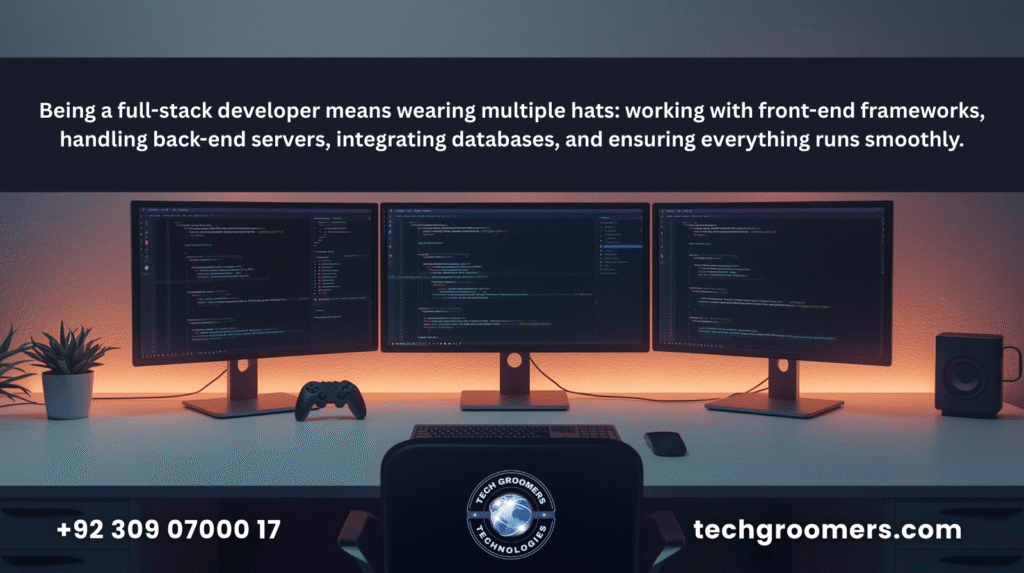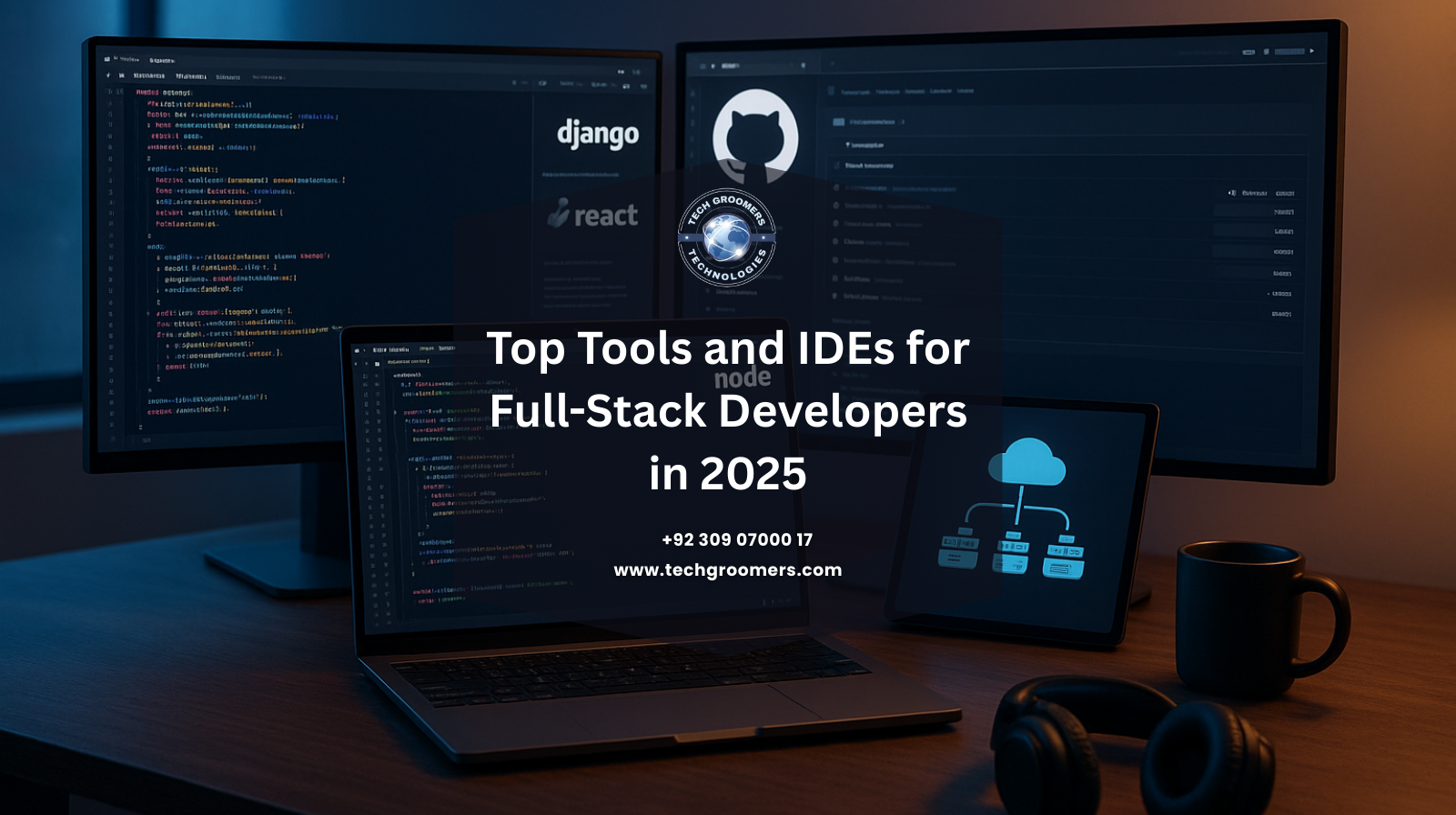If you’ve ever tried to juggle writing front-end code, managing back-end logic, and keeping databases in check, you already know the life of a full-stack developer can get pretty overwhelming. Luckily, modern tools and IDEs (Integrated Development Environments) are designed to make this job easier, faster, and more efficient. In 2025, developers have access to some of the most advanced, feature-rich platforms ever built, and knowing which ones to use can make all the difference in your productivity and project quality.
In this blog, we’ll break down the top tools and IDEs for full-stack developers in 2025 so you can pick the right setup for your workflow.
Why Tools and IDEs Matter

Being a full-stack developer means wearing multiple hats: working with front-end frameworks, handling back-end servers, integrating databases, and ensuring everything runs smoothly. The right tools can help you:
- Write cleaner, more efficient code.
- Debug issues faster.
- Collaborate seamlessly with team members.
- Manage projects with less stress.
Choosing the right IDE or tool can often be the difference between frustration and flow.
1. Visual Studio Code (VS Code)
VS Code continues to dominate in 2025 as the go-to editor for full-stack developers. It’s lightweight, highly customizable, and packed with extensions that cover everything from front-end frameworks to back-end environments.
Key Features:
- Extensions Marketplace with thousands of tools for React, Node.js, Python, and more.
- Built-in Git integration.
- Live Share for real-time collaboration.
- Powerful debugging tools across multiple languages.
With regular updates and strong community support, VS Code remains an essential tool in any developer’s toolkit.
2. JetBrains WebStorm
For developers heavily invested in JavaScript and modern frameworks like React, Angular, or Vue, WebStorm is a powerhouse IDE. While it’s not free, the productivity boost it offers makes it worth the investment.
Key Features:
- Intelligent code completion and navigation.
- Built-in support for Node.js and testing frameworks.
- Refactoring tools that save time.
- Seamless integration with TypeScript and ES6+ features.
If you’re working on large-scale projects where JavaScript is the core, WebStorm is a great choice.
3. IntelliJ IDEA
For developers who go beyond JavaScript and work with languages like Java, Kotlin, and Scala, IntelliJ IDEA is unmatched. It’s often favored in enterprise environments where multiple technologies are used together.
Key Features:
- Deep integration with Spring Boot, making it perfect for back-end development.
- Excellent database management tools.
- Built-in version control and team collaboration features.
- Supports multiple frameworks and platforms.
IntelliJ IDEA is a full-fledged environment for teams working across front-end and back-end stacks.
4. Eclipse Theia
Eclipse Theia has gained traction as a modern, cloud-first IDE built on top of the same architecture as VS Code. It’s highly customizable and designed for teams who want flexibility and scalability.
Key Features:
- Works both as a desktop and cloud IDE.
- Built on open-source technologies.
- Compatible with VS Code extensions.
- Ideal for remote development setups.
As more companies shift toward cloud-based workflows in 2025, Theia is becoming a strong contender for full-stack development.
5. Replit
Replit has evolved from a beginner-friendly platform into a professional-grade cloud IDE that supports real-time collaboration and deployment. It’s especially useful for teams and freelancers who want to prototype, test, and deploy apps without heavy setup.
Key Features:
- Cloud-based environment with no local setup required.
- Instant collaboration features (like Google Docs for code).
- Supports full-stack applications with databases and hosting.
- Great for building and sharing projects quickly.
For developers who prioritize accessibility and speed, Replit is an excellent tool.
6. Sublime Text 4
While not a full IDE, Sublime Text remains a favorite among developers who prefer speed and simplicity. In 2025, Sublime Text 4 continues to offer lightweight editing with powerful customization options.
Key Features:
- Blazing fast performance.
- Wide range of plugins for full-stack development.
- Multi-caret editing for rapid coding.
- Works smoothly with large files.
It’s ideal for developers who want a minimalist setup without sacrificing efficiency.
7. GitHub Codespaces
GitHub Codespaces is transforming how developers collaborate by offering cloud-hosted development environments directly integrated with GitHub repositories.
Key Features:
- Pre-configured environments that launch instantly.
- Supports extensions and themes from VS Code.
- Perfect for remote teams.
- Scales easily for enterprise projects.
As remote work continues to dominate in 2025, GitHub Codespaces has become a go-to option for distributed teams.
The Future of Developer Tools

As full-stack development grows more complex, tools and IDEs are evolving to:
- Support AI-powered code suggestions.
- Provide seamless cloud integration.
- Enhance collaboration with real-time editing.
- Improve performance monitoring and debugging.
Developers in 2025 are no longer limited by local environments. Instead, they have access to powerful, cloud-enabled tools that allow for faster, more efficient workflows.
Final Thoughts
Choosing the right tools and IDEs can significantly improve your productivity and code quality as a full-stack developer. Whether you go with VS Code for its versatility, WebStorm for advanced JavaScript projects, IntelliJ IDEA for enterprise-level development, or Replit for cloud-based convenience, the key is finding the environment that matches your needs.
In 2025, full-stack developers are spoiled with options that not only enhance coding but also streamline collaboration, deployment, and scalability. With the right tools, you’ll be equipped to handle any project—big or small—with confidence and efficiency.




Leave a Reply